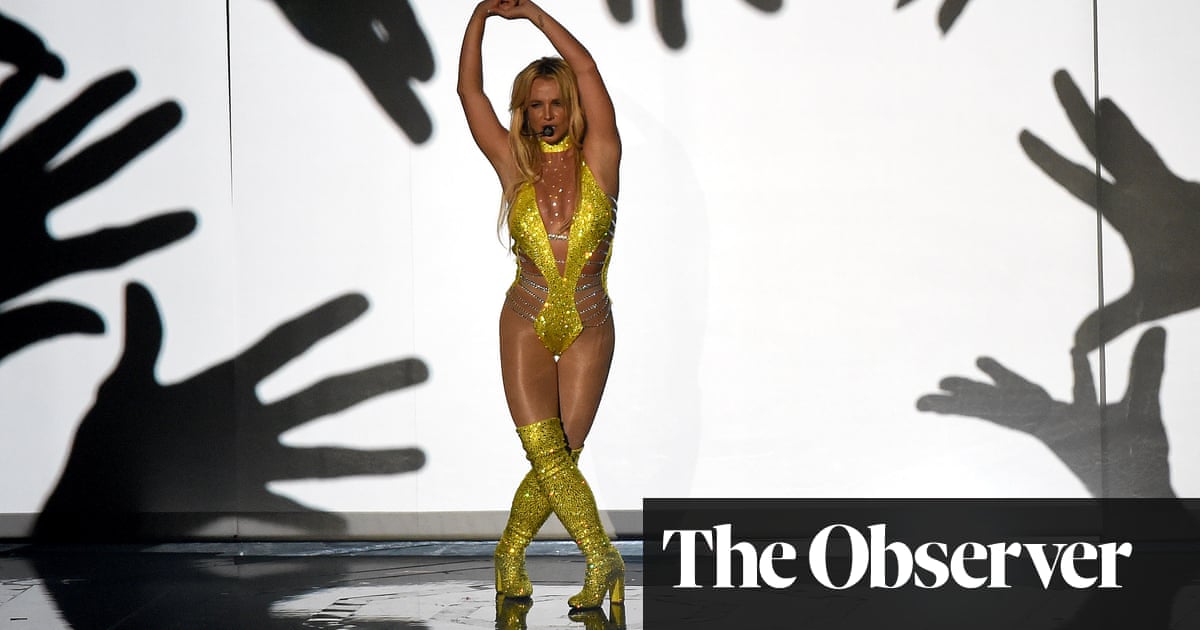In 2021, JD Vance told Fox News that senior Democrat women were just “childless cat ladies”, lacking cultural or social value compared with their married and procreating counterparts. When Taylor Swift looked down the barrel of this insult with apost on Instagramshowing her posing with beloved feline Benjamin Button (fromTimemagazine’s photoshoot naming her 2023’s person of the year), she embraced the role of killjoy, rejecting Vance’s attempt to divide women. But even this gesture of defiance and solidarity was not enough to push back the red tide of misogyny and corruption: Trump was elected to a second term, the US was denied a female leader, and millions of women held their breath.
When Sophie Gilbert, a Pulitzer-nominated journalist and critic at theAtlantic, was writingGirl on Girl, the 2025 Trump administration was just a worrying possibility. But Gilbert’s account of women’s degradation since the early 90s through pop culture sounds a crescendo of doom towards this present moment. With what she calls a “wry nod” to lesbian porn, you’d be forgiven for concluding from her title that Gilbert thinks women are the problem. But it’s the patriarchy, stupid.
Born in the 80s, Gilbert wanted to better understand the world of her girlhood, and the sexualised power women were taught to value in themselves and scrutinise in others. Madonna and riot grrrl were “switched out” for male-managed girl bands, and music moved away from “angry and abrasive and thrillingly powerful” visions of social injustice to the vanilla offerings of “girl power”. Gilbert recounts the rise and fall of Britney Spears, the exposure of the Kardashians and the exploitation of models such as Kate Moss against wider trends in the music scene, tabloid rags and reality TV, the art world, advertising agency boardrooms and our Instagram feeds. She argues that the promises of third-wave feminism were “blunted by mass culture”, which trained women not to be shrill, not to be a prude, and not to get (visibly) old. Gilbert claims that women were turned against one another, neutralising the potency of feminism’s promise. Meanwhile, post-feminism was fed by porn (“the defining cultural product of our times”) and opportunistic capitalism, facilitated rather than challenged by Sheryl Sandberg’s individualist corporate movement in 2013 imploring women to #LeanIn.
Gilbert writes that popular culture is invariably “calibrated to male desire”, which has ushered in “cruelty and disdain” towards 51% of the population, particularly if they are not white.Womenare told they’re never good enough, but better can be bought: contouring, surgical enhancement and dieting sell an ideal that “can’t actually be humanly attained” but can be purchased, now with a single click. Getting by as a woman in post-feminist times means not taking apparently misogynistic music, art and TV too seriously, while women are being exploited, mocked and assaulted in plain sight, as #MeToo belatedly attested. When porn is everywhere, most worryingly on the phones of primary school children, no wonder 38% of women in the UK said they experienced “unwanted slapping, choking, gagging or spitting during sex”. The blokeish “irony-as-defence motif”, which nudges women to be in on the gag, denies the truth that sexist and racist cultural products profoundly change the way society thinks about women and therefore how women are treated.
Are there any solutions? Gilbert’s writing pays tribute to feminist texts that came before her, from Naomi Wolf’sThe Beauty Myth, Susan Faludi’sBacklashand Ariel Levy’sFemale Chauvinist Pigs, to Jia Tolentino’sTrick Mirrorand Amia Srinivasan’sThe Right to Sex, all of which are quoted at length. WhileGirl on Girlfocuses on where pop culture has gone wrong for women, I enjoyed Gilbert’s praise for Madonna,Rachel Cusk, Sheila Heti and Chris Kraus’s resistant voices, and her book would have benefited from more. In her conclusion about potential bulwarks against women’s dehumanisation, Gilbert starts to make an intriguing argument about romantic love as a force of gender equality and respect, but this runs out of steam.
When Gilbert was pitchingGirl on Girl, potential editors wanted more of her first-person voice. She felt “conflicted” about female confessional writing, and refused. The result is that Gilbert retreats from voicing her full indignation. She insists she’s “not interested in kink-shaming, and not remotely opposed to porn”, even while diagnosing porn as an unquestionable source of harm to women. Moreover, Gilbert doesn’t describe the conditions under which porn can be a force for good, which seems important to know in order to decide when to be what the scholar Sara Ahmed has called a feminist killjoy: “someone who speaks out about forms of injustice, who complains, who protests, who says no”. I finishedGirl on Girlstruck by Gilbert’s skilful marshalling of evidence and elegant writing, but looking for a bolder claim about where the real problem lies and what can be done about it.
Kate Womersley is a doctor and academic specialising in psychiatry
Girl on Girl:How Pop Culture Turned a Generation of Women Against Themselves by Sophie Gilbert is published by John Murray (£20). To support theGuardianandObserverorder your copy atguardianbookshop.com. Delivery charges may apply
